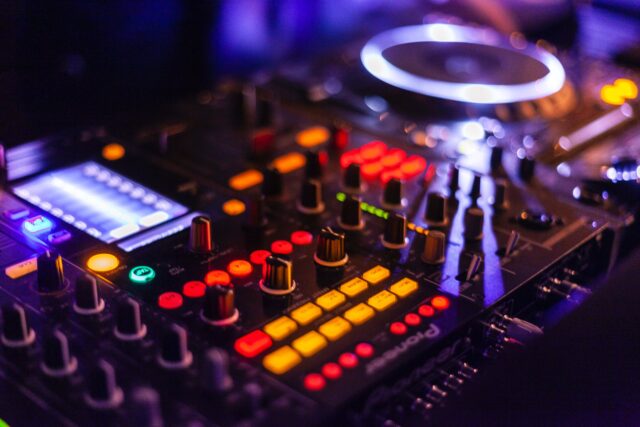
We all know that there is a huge difference between enjoying music and creating it. DJs have the ability to combine both worlds and create mixes of music that light dancefloors on fire. Many people think DJs aren’t musicians because they don’t necessarily produce their own music, but that’s actually far from the truth. There is a lot of talent involved in mixing tracks together and creating a certain musical atmosphere. Finding the right kind of track to match it with another is not an easy task, and some people may spend years being able to pull it off. A lot of the successful DJs in the scene have a lot of musical knowledge and most of them already produce their own tracks, mixing them along with others.
The tools a DJ uses can make or break them. There is a lot of technical knowledge and equipment involved in the mixing of tracks, especially on a big venue with a huge audience. While it’s possible to mix tracks using only software, all prominent DJs use hardware to create the freshest mixes, sometimes during a live set. Jazz was the first type of music to be mixed back in 1935, but DJing started encompassing almost every genre out there. The tools of today have gotten much more complex. Keep on reading to see the tools that shaped the music of 5 of the most successful DJs.
1. Fat Jon
As one of the most loved hip hop and Lo-fi producers in the scene, Fat Jon’s mix of hip hop and downtempo funk jump-started his career as a DJ back in 2001. His ability to introduce the warm vinyl sounds to his digital tracks has been applauded in the online streaming communities for many years. His focus on software is apparent in the type of genres chosen to produce, with minimal usage of hardware. The Akai MPC 2000 is a classic but it does suit Fat Jon’s style very well. As heard on samplified.us, the Chillhop-based and authentic vinyl vibes are quite dominant in the samples he worked on. His most notable tracks can be found in the original soundtrack of the anime cult hit Samurai Champloo.
2. Martin Garrix
One of the top DJs and producers in today’s scene, Martin Garrix made a name for himself back in the 2010s. Even though he is quite young, 24 years old, his talent was quite apparent as he produced the all-time-favorite track “Animals” when he was only 17 years old. It garnered over 1 billion views over YouTube and reigned supreme in the top 10 charts in dozens of countries. Even though Garrix is a seriously talented producer, his DJ sets are also great and loved by many. The tools that Garrix uses in his DJ sets are mainly software as he prefers it over hardware because of its convenience and high quality.
The DAW that Martin uses is FL Studio, and he’s so reliant on it that he keeps multiple versions installed on his PC. The plugins that Garrix is known to use, according to his guides and tutorials on YouTube and his interviews are Sylenth1, Native Instruments Massive, and reFX Nexus. He uses KRK Rokit 6 monitors and a Roland A-500S Midi controller. The mixer used in his sets is a Pioneer DJM-900 Nexus.
3. David Guetta
The Parisian DJ has started out his days playing in underground clubs and throwing his own parties, and it seems that people started recognizing his talent on a local level when he collaborated with Robert Owens. He started out as a house DJ and then slowly built his fame as a producer with one successful hit after another. Guetta is one of the few EDM DJs that has earned Grammy Awards alongside multiple DJ awards. With sales records of 30 million singles and 9 million albums, considered by many to be the godfather of EDM.
Guetta mainly uses two different DAWs to get the job done, which is understandable, considering how diverse his style is. He may sometimes use a bit of FL Studio alongside Audacity. He shares some similarities with Garrix when it comes to software instruments like Native Instruments Massive, reFX Nexus, Lennar Digital Sylenth1, and Future Audio Workshop. His repertoire of effects plugins includes Romero’s sidechain compression, Cableguys Halftime, and Industrial Strength’s. Guetta’s used a lot of hardware over the span of his career including Pioneer RMX 1000, EFX-500, CDJ-2000, Akai Pro LPK25, and Novation 61SL MKII MIDIs.
4. Armin Van Buuren
Considered as one of the godfathers of trance music, Armin Van Buuren has been on the decks causing major uproars around the world since 1996. He is the creator of the famous State of Trance compilation show, which a lot of DJs have caught on the drift of fame through being featured in. With 6 highly successful albums under his belt, Armin takes his time to produce unique tracks that almost always top the charts every year. There is no single DJ who has more entries in the EDM charts than Armin.
Armin is more of an old school guy that prefers using hardware over software at any given time. His most prominent pieces of hardware include Native Instrument Maschine, M-Audio Keystation 88-Key MIDI, Akai APC40, Native Instrument Komplete Kontrol, the rare Shadow Hills Mastering Compressor, in addition to many others. He uses two DAWs, which are Ableton and Logic. The plugins he chooses to use with them are Spectrasonics Omnisphere, FabFilter Twin, Lennar Digital Sylenth1, and reFX Nexus 2.
5. Tiesto
Even those who have never listened to a single trance track in their lives know who Tiesto is. The name used to be synonymous with trance music until Tiesto started shifting his direction and style towards house tunes. He won a Grammy Award for his work on the remix of All of Me. Awarded the “Best DJ of All Time” by prominent DJ magazines in 2011 and 2013. Tiesto has played in all the big-scale major EDM venues of the world.
Tiesto uses a variety of DAW software like Ableton Live, Logic Pro, and Cubase. He uses a balanced mix of software. The most commonly used plugins are reFx Nexus 2, Lennar Digital Sylenth1, Sugar Bytes WOW, Camel Audio CamelCrusher, and many others. The hardware used is a bit on the classical side with a Roland Juno-60 used in some of his top highlights. A variety of mixers include CDJ-1000, CDJ-2000, and Denon DH SC5000.
DJ’s are becoming more and more successful with the passage of time, and naturally, so is their net worth. They really couldn’t have reached where they are today without their skill, then the right equipment and tools. Even though the talent is inherent and the vision varies from one DJ to the other, understanding what tools helped them to get to where they are will certainly open doors for you.







